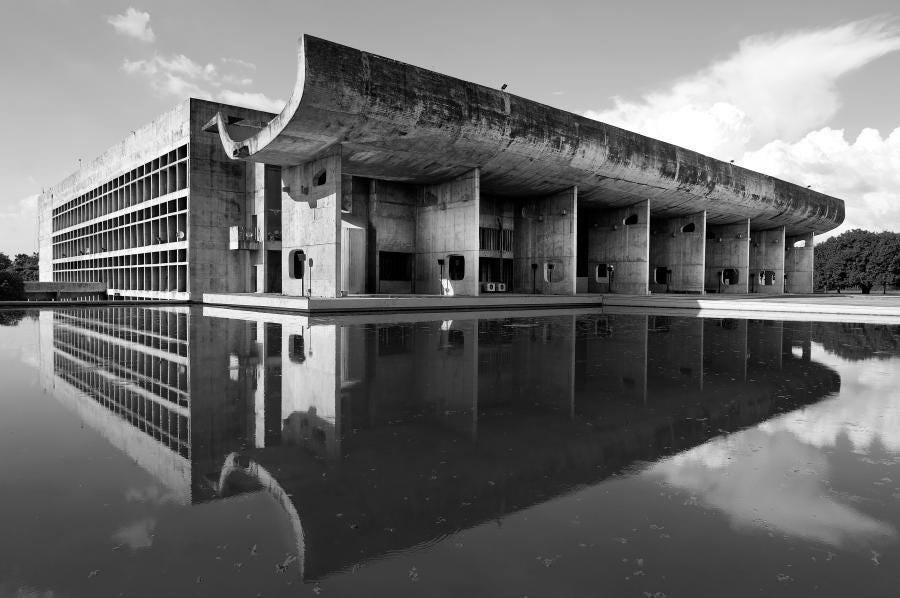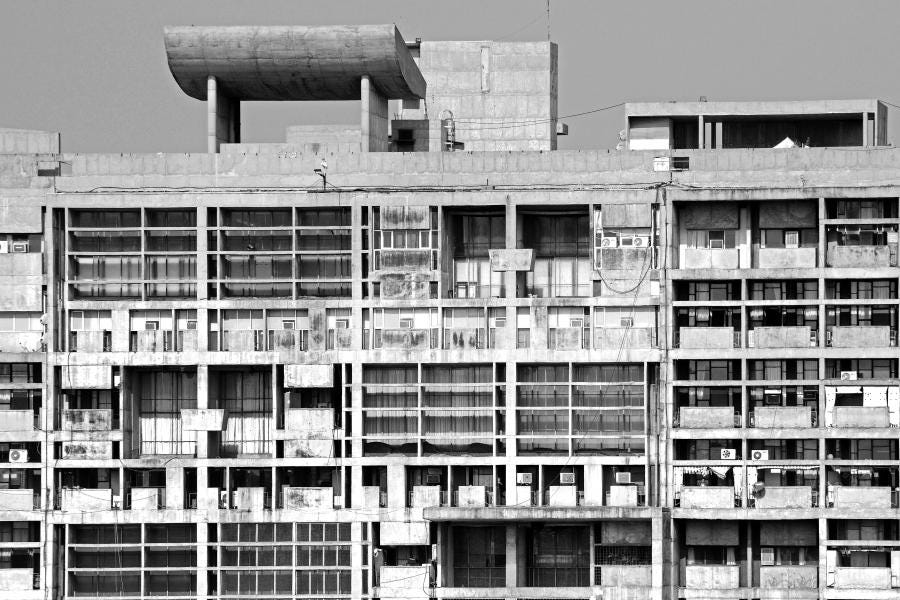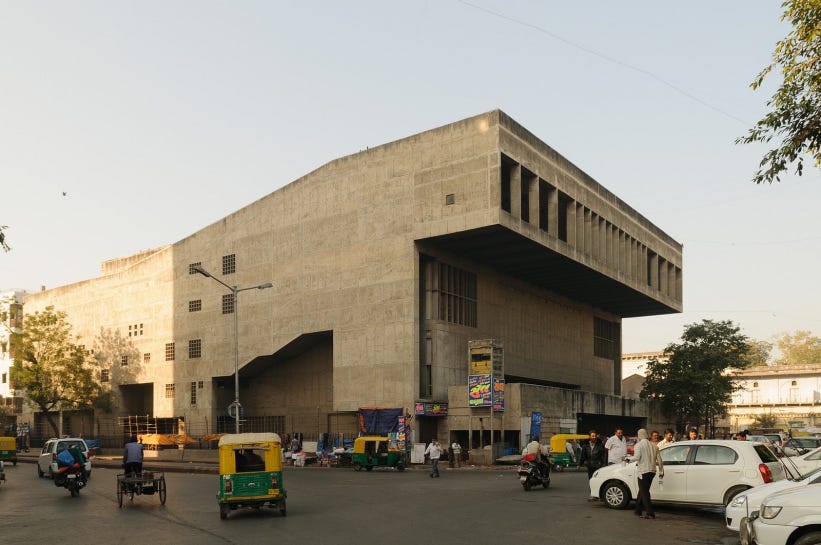On Tenet And Brutalist Architecture
It seems the only way to express my love for Christopher Nolan's most uncertain film, Tenet, is to describe how raw exposed concrete makes me feel
My introduction to the Nolan filmography was watching Inception on the airplane television- the audio was working on only one earphone, and the subtitles were in Arabic- the muffled audio was further ruffled, grainy, and rendered inaccessible by the in-flight turbulence. At that point I thought the film was designed to be a senseless-spectacle, peddling only in awe. I didn’t know much about Nolan or his myth, and this was just another film people were talking about at the time, that I was intrigued by. So I didn’t fit the film into his filmography, because I couldn’t, and so merely enjoyed it as the sensory warp and weft of space.
It thus, then, made sense to me that ‘-ception’ became a suffix to explain things that don’t just elude the grasp of logic, but things that are designed to elude the grasp of logic. But it was only three re-watches and two years later that I recognized that if you want to, and pay attention to it, the film is designed to make perfect sense, while those lurking can also find something deeper, more primal, and existential in it. The joy of having cracked it triumphed the agonies of conscious oblivion that I was housing until then. The appreciation for its beauty, remains.
Then, years later when I was watching Interstellar in the theater, I fell asleep, but woke up in time to weep when the father sees those accumulated tapes of his daughter ageing. Even without much context, it worked. It makes me think about Baradwaj Rangan’s statement in his review of the Tamil film Soorarai Pottru, essentially an extended reel of Suriya thirst-traps.
… the breakdown [of Suriya] comes across like a standalone scene, like something from an acting audition. Again, Suriya is terrific, but we are responding to the actor’s efforts, not the character’s plight. We’ve been air-dropped into this moment. We’ve not arrived at it organically.
This made me think about why I reacted the way I did to Matthew McConaughey’s weeping- was it his acting as it is or acting as enmeshed in the character? I wish I could go back to that moment and provide an answer, but unless I live in a Nolan universe that doesn’t seem imminent.
Interstellar remained with me, Hans Zimmer’s thud-sounds for the big-flood became meditation music. Then, when I watched Dunkirk in the theater, I shirked off the perfect sense the film was to make- not even trying to understand it, coming out of the theater with only that last image of plane burning by the banks. That image still haunts in the way the fire sparks from The Revenant do- they evoke this sense of radical, violent loneliness. But by this time, I couldn’t care less if Nolan was or wasn’t making sense to me. It was the arrogance of post-teenage-hood- if he wants to be celebrated, he should try to first be understood. In my eyes, he was just another architect of beauty. His Batman films hooked me, but I was put off by the hagiographies written by his fans, elevating him and his films to myth-dom. Of what allure is fandom literature to a redolent atheist?
Now, this is all context to state that my connection to Nolan was tenuous, fragile, but always engaged since I first saw Inception. I was quite excited for Tenet, and perhaps if a theater was close-by and I wasn’t living with my ageing parents, I might have gone. But if watching Nolan has taught me anything, it is that the contingencies of time belong to the philosophy seminar room. It is the messiness of time that is really worth considering as we live life. (I find it an interesting thought experiment- would Nolan be more mad that I pirated the film or that I watched it on a small screen with two horizontal scratches, cleaning up coconut sevai that I dropped as bombs and time exploded on screen?)
I will talk about Tenet with spoilers of sorts, but not the kinds that I wouldn’t want to know before watching. But anyways in Nolan’s universe, a spoiler is but a review from the future.
I liked the film. I really did, because and not inspite of its messy, indulgent, questionable, grand, convenient, abstract, over-articulated, under-understood narrative. The brand of Nolan promises more doubt that clarity, then who the fuck am I to demand perfect sense in the first viewing?
The film begins with brutalist architecture in Minsk, and my god- Brutalism is so sexy. When Prince Charles looked at Britain National Theater, built in the Brutalist tradition of exposed concrete, he said it looked like a “nuclear power plant”. He would have something similar to say about this opening structure of Tenet.
I am reminded of Sarovar Zaidi’s quote in her piece on Modernist architecture:
Even as architectural practice has overwhelmingly become about perfecting the form rather than negotiating with life, the seepage of human life is inevitable. The room, the office, the house and the city will be inhabited; the humans will move in; and they will have to be controlled…
We know better that nothing lasts forever—not buildings, not us and not even love. Yet in our frail lives, we linger over soft windows, watching and waiting for that one beloved to return, for life to go on, for there to be a roof on our heads and a room of one’s own.
Listening to the way Brutalism as a form of architecture is described in this video. I couldn’t help but wonder if the same could be said about Nolan’s craft.
“To create a kind-of arts complex… which is tough and uncompromising, and maybe makes you feel a bit unsettled, taken outside of the everyday world… It’s so much more than functional architecture- they want you to have an aesthetic experience.”
Here are some photographs of Brutalism as it manifested in India, especially works of Corbusier, who foreshadowed the movement, constructing the Indian city of Chandigrah- so you recognize its power of scale and awe. A similar if not same kind of awe I am filled with watching the smooth camera movements in a Nolan film, especially Tenet. (Photos by Shaun Fynn)
In Gujarat too the architect maven BV Doshi designed the Premabhai Hall in old Ahmedabad. When I worked briefly in the city, I took a day off and scurried the old city with a boy, the mosques and the pols, and in the midst of a market I suddenly saw this towering building, and completely lost perspective for a second. I had no idea BV Doshi built it, nor did I know about Brutalism back then. I was just struck by this imposing, jutting structure of concrete. It was abandoned then and even after coaxing the snoozed up security guard I wasn’t allowed inside. A year later I would come across an article in Architecture Digest that would give context to this memory and would send it to the boy who was being impatient while I prodded the security guard- see, the building was of value! (Photo by Arnout Fonck)
So, we get that in Tenet time is moving both forwards and backwards through the film, and sometimes these motions collide, and there is nothing to do here but revel in its chaos.
Now, this is the frustrating part of the movie- it is is both a logical loop-hole and a logical coup. This felt odd to me, because of that expectation of perfect-sense that I walked into the film with. At one point Robert Pattinson who plays The Protagonist’s lover (this is not a subtext, Tenet is a homosexual love story shredded by the tyranny of time- so many critics are riled up about the lack of an emotional thrust for this film, but I found everything I needed in the long drawn gazes, and that sweet-final promise of an end and a beginning) explains the Grandfather Paradox of time travel. (if you go back in time, and kill your grandfather before he has children, how could you be born to then go back to the past to kill your grandfather? Don’t ask why it isn’t called the Grandmother Paradox, and don’t ask why the women in this film are so stoic.) When The Protagonist asks him how people are now able to time travel with such impunity and arrogance, Pattinson replies:
“There’s no answer, it is a paradox.”
The entire film’s cut-and-thrust is thus on shaky ground- and this was what peeved me. I thought I was supposed to be the one housing uncertainty and doubt- who the fuck gave Nolan the power to be uncertain?
I loved that Ruhaan Shah in his review called it “time-fetishism” and “scientific exhibitionism”. It is that exactly, and like the bare exterior of a brutalist building, it’s inviting you into its hollow interiors where there is only space for light, shadows, and awe. As the dust settled on the film, I thought back to Anthony Lane, and his review in the New Yorker, citing that the amount of awe he felt in the scene where The Protagonist jumps on a puddle in reverse, was the same amount of awe he felt through that long-drawn climactic battle. The point Lane was making was that Nolan was showing off, but this time, he as a viewer couldn’t buy into its hyperbole. It makes me wonder if I took Lane visit the Palace Of The Assembly in Chandigarh, he would look at it and say, “But the Jantar Mantar is just as beautiful”.




This is really well written! I love getting these in my inbox every week! I watched the movie in the cinema hall a couple months ago and couldn't quite make sense of it all. However, I felt that a less self-indulgent filmmaker would have focused solely on the tragedy of Pattinson's character.
Hi Prathyush, I really liked the review! It has some beautiful lines in it. For a few instances, I did feel that the windowpane could have been clearer, less conspicuous. But the heavy-wordiness worked really well when it did! 👍
I also liked how your Nolan experiences shaped your writing, and how it differs from most fanbois I've read and seen either gush or trash-talk Tenet.
Last, I enjoyed how little you talk about the film but convey exactly what you mean. And how you impart a few tenets of your own, regarding architectural beauty and all that! Subscribed! :)